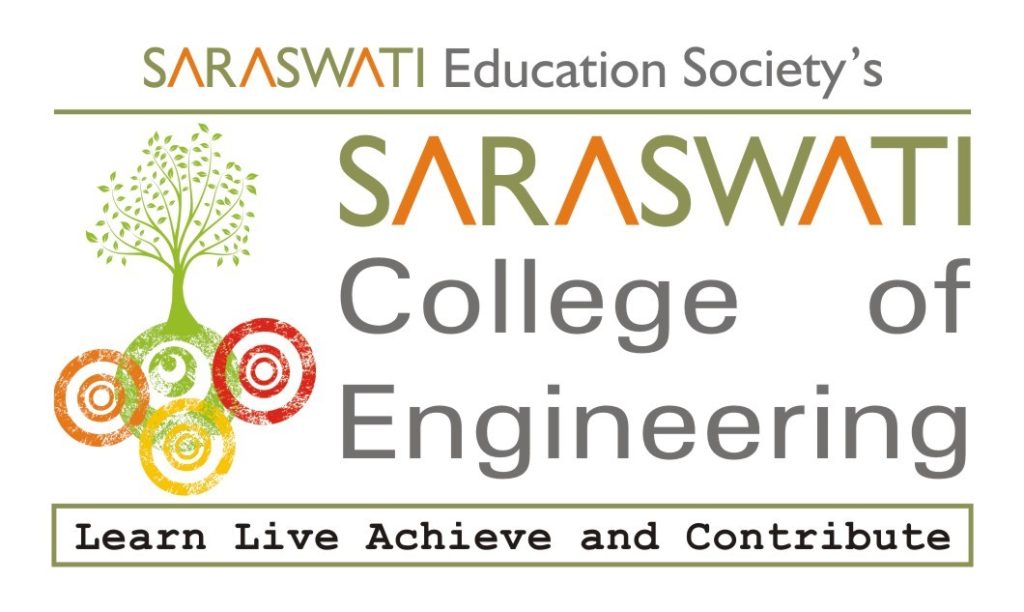Mechanical Engineering Subjects & Career Scope – Full Guide

Introduction
Mechanical engineering is a cornerstone of technological advancement, continually evolving to meet the dynamic demands of modern industries. It is a four-year full-time specialised program designed to equip students with a strong foundation, core mechanical principles, and advanced technical skills, from developing innovative machinery to optimising manufacturing processes. Institutes like Saraswati College of Engineering, SCOE, offer courses like the B.E. in Mechanical Engineering Program that create professionals in this engineering field with analytical and research skills to promote continuous learning. It emphasises delivering theoretical knowledge and focuses on providing practical insights and hands-on experience. This program opens doors to diverse career paths in the auto, aerospace, and renewable energy industries. At SCOE, aspiring engineers receive a holistic education and mentorship, making way for a successful career in mechanical engineering.
Mechanical Engineering Curriculum: 1st to 4th Year Overview
Download the Latest R-19 C Scheme Mechanical Engineering Syllabus (2024)
Download SE to BE Mechanical Engineering Revised Syllabus (2016 Pattern)
Download Mechanical Engineering Syllabus – CBCGS R-12 Pattern
The B.E. in Mechanical Engineering at SCOE spans four years and is structured to provide a comprehensive understanding of mechanical systems and their applications. The curriculum is as follows:
1st Year: Foundational Sciences and Mathematics
– Engineering Mathematics: Essential math for engineering.
– Engineering Graphics: Technical drawing and design.
– General Chemistry: Basics of chemistry for engineering.
– Material Science: Properties and behavior of materials.
– Basic Electronics: Fundamentals of electronics and circuits.
2nd year: Core Mechanical Concepts
– Machine Drawing: Design and construction of machinery.
– Manufacturing Processes: Methods like casting and welding.
– Applied Thermodynamics: Heat and energy transfer.
– Fluid Mechanics: Study of fluid behavior.
– Nanoscience & Nanotechnology: Introduction to nanotech applications.
3rd year: Advanced Theoretical and Practical Applications
– Solid Mechanics: Stress, strain, and material behavior.
– Measurement & Meteorology: Measuring physical quantities and weather principles.
– Heat Transfer: Conduction, convection, and radiation.
– Machine Dynamics: Motion of machines and systems.
– Control Systems: Feedback systems in engineering.
4th year: Specialisation and Industry Integration
– Engineering Product Design: Designing mechanical products.
– Mechatronics: Integration of mechanical, electrical, and computer systems.
– Automobile Engineering: Design and operation of automobile systems.
– Industrial Management: Managing engineering projects and resources.
SCOE’s curriculum balances theoretical knowledge and practical application, ensuring graduates are well-equipped to tackle real-world engineering challenges.
The Future of Mechanical Engineering: Emerging Trends
As with every other sector, the field of mechanical engineering is also expanding rapidly, adapting to incorporate interdisciplinary technology and addressing global challenges and industry needs. Mechanical engineers are now in demand in the automated, aerospace, manufacturing, energy, and construction sectors. With the expansion of the field, the need for skilled engineers is also increasing, resulting in numerous opportunities in renewable energy, robotics automation, and digital manufacturing across the globe. The future of mechanical engineering in India is promising. Still, it requires a proactive approach to lifelong learning, embracing emerging technologies, and addressing the skill gap to thrive in the evolving technological landscape. Some of the key emerging trends include.
1. Integration of Artificial Intelligence (AI) and Machine Learning (ML)
AI and ML revolutionise design processes, predictive maintenance, and system optimisation. Engineers leverage these technologies for simulations, diagnostics, and enhancing operational efficiency.
2. Advancements in 3D Printing and Additive Manufacturing
Additive manufacturing enables rapid prototyping and the creation of complex geometries, reducing material waste and production time. This technology is pivotal in industries like aerospace and healthcare.
3. Emphasis on Sustainable and Green Engineering
There’s a growing focus on developing eco-friendly solutions, such as energy-efficient systems and biodegradable materials, to minimise environmental impact.
4. Expansion of the Internet of Things (IoT)
IoT facilitates real-time monitoring and data collection, enhancing mechanical systems’ predictive maintenance and operational efficiency.
5. Adoption of Augmented Reality (AR) and Virtual Reality (VR)
AR and VR technologies transform training, maintenance, and design visualisation, allowing engineers to interact with virtual models and simulations.
6. Development of Digital Twins
Digital twins—virtual replicas of physical systems—enable real-time analysis and optimisation, improving product lifecycle management and performance monitoring.
7. Exploration of Nanotechnology and Advanced Materials
Engineers are developing materials with enhanced properties, such as self-healing capabilities and increased strength-to-weight ratios, expanding applications across various sectors.
8. Transition to Renewable Energy Systems
Mechanical engineers are at the forefront of designing and optimising systems for renewable energy sources, including wind turbines and solar panels, contributing to global sustainability goals.
9. Emphasis on Cybersecurity in Engineering Systems
With increased connectivity, ensuring the security of mechanical systems against cyber threats is becoming a critical aspect of engineering design and operation.
10. Focus on Collaborative and Interdisciplinary Engineering
The complexity of modern engineering challenges necessitates collaboration across disciplines, fostering innovation through diverse perspectives and expertise.
Preparing for a Dynamic Engineering Landscape
As mechanical engineering evolves, professionals must adapt by acquiring new skills and embracing lifelong learning. Key areas for development include:
- Proficiency in Digital Tools: Familiarity with simulation software, CAD, and data analysis tools is essential.
- Understanding of Emerging Technologies: Staying informed about AI, IoT, and advanced manufacturing techniques.
- Commitment to Sustainability: Incorporating eco-friendly practices and materials in engineering solutions.
- Interdisciplinary Collaboration: Working effectively with professionals from various fields to address complex problems.
Why choose SCOE for a B.E. in Mechanical Engineering in Mumbai?
Saraswati College of Engineering can be the best option for aspiring engineers who want to build a bright future. This college provides a comprehensive curriculum, experience, and practical insights, enabling graduates to become professional experts. It has a dedicated faculty of industry veterans, cutting-edge facilities, and a robot curriculum that prepares you for a dynamic career in the field of mechanical engineering. It provides a platform for students to participate in research, innovation, and entrepreneurship, which enhances the communication, teamwork, & leadership skills to accept challenges in all facets of life, ethically. SCOE has a strong Alumni network, which opens doors to top-tier companies and global opportunities. SCOE helps secure students’ future by providing excellent placements with new, creative salary packages and numerous opportunities in life.
To pursue a B.E. Mechanical Engineering from Saraswati College of Engineering, students should meet the criteria set by the college. Some of the vital information about the course and the college related to admission, eligibility and job opportunities is mentioned below:
Eligibility for Mechanical Engineering:
- 10+2 or equivalent from a recognised school board (Science stream is mandatory)
- 50% for the Open Category and 45% for the reserved category
Admission Process:
- Entrance Examination: MH CET or JEE / 3 Years Diploma.
- Average Salary: INR 5 to 8 LPA.
- Fees per year: Rs. 1 Lakh 10 Thousand (For exact fees, contact the College administration).
- Leading Recruiters: Caterpillar Inc., ABB Ltd., ThyssenKrupp, Honeywell. Johnson Controls, Tata Motors.
Job Position after successful completion of the program: Mechanical Engineer.
- Mechanical engineer manager.
- Maintenance manager.
- Research and development engineer.
- Nuclear engineer.
- Powertrain engineer.
- Senior design engineer.
- Tool engineer.
CONCLUSION
Mechanical engineering is an advanced engineering program that creates competent engineers with analytical and research skills for promoting an environment of continuous learning. This program emphasises mathematics, science, and engineering fundamentals to solve complex information, technology, and engineering problems. After completing this program, one can identify, understand, formulate, and analyse complex engineering problems and design thermal management and mechanical systems manufacturing. Students turn into professionals who can plan and execute efficient, safe, sustainable and cost-effective manufacturing of IC mechanics, and air conditioning via the use of CAD/CAM/CAE tools, ethically. Choosing the best college for pursuing mechanical engineering is one of the first crucial steps towards building a career in this field. Saraswati College of Engineering can be a good choice. It provides a comprehensive and forward-thinking curriculum and ensures its graduates are adept at traditional mechanical principles and pioneers in integrating emerging technologies.SCOE prepares its students to be leaders in the ever-evolving landscape of mechanical engineering.


